13 jan 2015

Fadi Qudeih 18 months
After three infant deaths as a result of severe winter weather in the Gaza Strip, one and a half year-old Fadi Qudeih passed away on Tuesday, in a caravan house where his family lives.
According to the PNN, the child's home was demolished during the Israeli attacks on Gaza this past summer, upon which his family moved to live in a caravan, in the region of Khan Younis, southern Gaza Strip.
The infant was found dead of severe cold, and moved to Nasser hospital.
The snow storm, Huda, which recently hit the region with temperatures that plummeted to some -4 degrees, has so far caused the deaths of at least five Palestinians, four of whom were infants between the ages of 1 month to 1.5 years old.
On Saturday, three-month-old Salma Al-Masri froze to death in Beit Hanoun, northern Gaza.
Local sources also reported that a baby named Adel Al-Laham (one month old), who lived with his family in similar housing, died after the dramatic drop in temperature.
On Friday, two-month old Rahaf Abu-Assi died following the drop in temperature, after a snow storm hit the area last Tuesday.
Ahmed Lahham, age 22, from southern Gaza also died as a result of inappropriate housing, after the Israeli attack on Gaza which left half a million Gazans with no shelter.
Gaza Civil defense spokesman, Mohammed Meidane, said Saturday that the winter temperature fall caused the flooding of numerous homes, adding that about 152 homes were evacuated from the southern part of the Gaza Strip after water flooded their houses, adding that civil defense was able to protect only 47 homes threatened by floods.
After three infant deaths as a result of severe winter weather in the Gaza Strip, one and a half year-old Fadi Qudeih passed away on Tuesday, in a caravan house where his family lives.
According to the PNN, the child's home was demolished during the Israeli attacks on Gaza this past summer, upon which his family moved to live in a caravan, in the region of Khan Younis, southern Gaza Strip.
The infant was found dead of severe cold, and moved to Nasser hospital.
The snow storm, Huda, which recently hit the region with temperatures that plummeted to some -4 degrees, has so far caused the deaths of at least five Palestinians, four of whom were infants between the ages of 1 month to 1.5 years old.
On Saturday, three-month-old Salma Al-Masri froze to death in Beit Hanoun, northern Gaza.
Local sources also reported that a baby named Adel Al-Laham (one month old), who lived with his family in similar housing, died after the dramatic drop in temperature.
On Friday, two-month old Rahaf Abu-Assi died following the drop in temperature, after a snow storm hit the area last Tuesday.
Ahmed Lahham, age 22, from southern Gaza also died as a result of inappropriate housing, after the Israeli attack on Gaza which left half a million Gazans with no shelter.
Gaza Civil defense spokesman, Mohammed Meidane, said Saturday that the winter temperature fall caused the flooding of numerous homes, adding that about 152 homes were evacuated from the southern part of the Gaza Strip after water flooded their houses, adding that civil defense was able to protect only 47 homes threatened by floods.
11 jan 2015
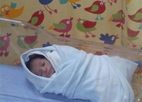
Salma Zeidan al-Masri, two months
Ahmad Sufian al-Lahham, 22
Another Palestinian infant died from the cold on Saturday, as well as a fisherman on the Gaza coast. This brings the death toll up to four in the last two days -- three of the dead have been infants under one year old.
The winter storm has severely impacted the people of Gaza, many of whom are still living in temporary shelters since they have been unable to rebuild after the Israeli assault in July and August of 2014 that left over 2100 people dead and tens of thousands homeless.
The latest casualty in the bitter cold of the winter storm has been identified as Salma Zeidan al-Masri, two months old.
She was staying with her family in a temporary shelter in Beit Hanoun, in the northern part of the Gaza Strip, since their home was destroyed in the Israeli assault this past summer.
One of the baby's relatives said that she turned blue from the cold, since there was no heating available in the temporary shelter.
In addition, Ahmad Sufian al-Lahham, 22, was found dead on the Gaza shore near Khan Younis in southern Gaza. He was apparently attempting to secure fishing equipment on his family's boat when he collapsed from the cold, and was later found dead.
The 1.4 million Palestinians living in Gaza have been suffering tremendously from the winter storm over the last several days, including flooding in many parts of the Strip and freezing temperatures.
The Turkish government had offered to provide Gaza with a 'floating power station', to provide some electricity and heat throughout the winter, but Israel prevented the Turkish government from donating the power station.
As a result, and due to the ongoing Israeli blockade of Gaza, most Palestinians whose homes were destroyed by Israeli bombs in the summer have been unable to import the necessary materials to be able to rebuild their homes. The main Gaza power stations also suffered extreme damage, and have been unable to return to even half their capacity in the months since the Israeli invasion.
Ahmad Sufian al-Lahham, 22
Another Palestinian infant died from the cold on Saturday, as well as a fisherman on the Gaza coast. This brings the death toll up to four in the last two days -- three of the dead have been infants under one year old.
The winter storm has severely impacted the people of Gaza, many of whom are still living in temporary shelters since they have been unable to rebuild after the Israeli assault in July and August of 2014 that left over 2100 people dead and tens of thousands homeless.
The latest casualty in the bitter cold of the winter storm has been identified as Salma Zeidan al-Masri, two months old.
She was staying with her family in a temporary shelter in Beit Hanoun, in the northern part of the Gaza Strip, since their home was destroyed in the Israeli assault this past summer.
One of the baby's relatives said that she turned blue from the cold, since there was no heating available in the temporary shelter.
In addition, Ahmad Sufian al-Lahham, 22, was found dead on the Gaza shore near Khan Younis in southern Gaza. He was apparently attempting to secure fishing equipment on his family's boat when he collapsed from the cold, and was later found dead.
The 1.4 million Palestinians living in Gaza have been suffering tremendously from the winter storm over the last several days, including flooding in many parts of the Strip and freezing temperatures.
The Turkish government had offered to provide Gaza with a 'floating power station', to provide some electricity and heat throughout the winter, but Israel prevented the Turkish government from donating the power station.
As a result, and due to the ongoing Israeli blockade of Gaza, most Palestinians whose homes were destroyed by Israeli bombs in the summer have been unable to import the necessary materials to be able to rebuild their homes. The main Gaza power stations also suffered extreme damage, and have been unable to return to even half their capacity in the months since the Israeli invasion.
10 jan 2015

Adel al-Lahham 1 month
The extreme cold weather in the Gaza Strip claimed the life of another infant in Khan Younis area after a baby girl froze to death on Friday.
Spokesman for the health ministry Ashraf al-Qudra said that a one-month-old boy named Adel al-Lahham died on Saturday morning as a result of the freezing weather conditions in Khan Younis.
The temperature in Gaza dropped to two degrees yesterday, but on Saturday afternoon, the cold spell started to recede.
A two-month-old girl, also from Khan Younis, was proclaimed dead on Friday after she suffered from a pulmonary obstruction caused by the cold, spokesman Qudra said.
War-displaced Gazan families have complained in recent days about the freezing cold they have had to endure in damaged or makeshift homes.
Several mobile homes in Gaza have been flooded as heavy rains and cold winds continue to pound the region this week.
Despite their modest means, the Palestinian authorities in Gaza have been working for days on evacuating residents from flood-hit areas and helping others affected or injured by the rainy storms.
The extreme cold weather in the Gaza Strip claimed the life of another infant in Khan Younis area after a baby girl froze to death on Friday.
Spokesman for the health ministry Ashraf al-Qudra said that a one-month-old boy named Adel al-Lahham died on Saturday morning as a result of the freezing weather conditions in Khan Younis.
The temperature in Gaza dropped to two degrees yesterday, but on Saturday afternoon, the cold spell started to recede.
A two-month-old girl, also from Khan Younis, was proclaimed dead on Friday after she suffered from a pulmonary obstruction caused by the cold, spokesman Qudra said.
War-displaced Gazan families have complained in recent days about the freezing cold they have had to endure in damaged or makeshift homes.
Several mobile homes in Gaza have been flooded as heavy rains and cold winds continue to pound the region this week.
Despite their modest means, the Palestinian authorities in Gaza have been working for days on evacuating residents from flood-hit areas and helping others affected or injured by the rainy storms.
9 jan 2015
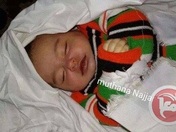
Rahaf Abu Asi 4 months
A four-month-old baby girl froze to death on Friday as a result of the cold weather conditions as she was in her family’s partially damaged home in Khan Younis.
A spokesman for the health ministry told the PIC reporter that four-month-old Rahaf Abu Asi died after her body temperature decreased.
Many Gazan families, who have no other option, still live in damaged homes, although they are no good shelter from the cold winter and harsh weather conditions.
Gaza child whose home was bombed by Israel dies in freezing weather
A Palestinian infant fell ill and died due to severe cold in Khan Younis in the southern Gaza Strip on Friday, as winter storm Huda pummeled the region for a third day.
Gaza Ministry of Health spokesman Ashraf al-Qidra said that two-month-old Rafah Ali Abu Assi died of chronic obstructive pulmonary disease as a result of the severely cold weather affecting the region.
Ashraf al-Qidra said that the infant was taken to the Gaza European Hospital early Thursday for treatment but was pronounced dead at noon on Friday.
The infant's family lives east of Khan Younis in an area that was heavily damaged during Israel's offensive on Gaza over summer.
Her family reportedly continued living in their damaged home despite the destruction. Due to lack of alternative shelter, many of the nearly 110,000 Palestinians left homeless by Israeli bombardment have done the same, including many living in just tents.
Temperatures in Gaza have been hovering only a few degrees above freezing in recent days as a freezing winter storm buffeted the region, flooding some areas in the small coastal enclave.
The situation is aggravated by the lack of fuel for electric power, meaning that power is available roughly eight hours a day, with occasional cuts on top of that.
The lack of fuel is a result of Israel's eight-year-old blockade of the Strip, which limits Palestinians' ability to import fuel for the electric power station in Gaza as well as for domestic needs.
A four-month-old baby girl froze to death on Friday as a result of the cold weather conditions as she was in her family’s partially damaged home in Khan Younis.
A spokesman for the health ministry told the PIC reporter that four-month-old Rahaf Abu Asi died after her body temperature decreased.
Many Gazan families, who have no other option, still live in damaged homes, although they are no good shelter from the cold winter and harsh weather conditions.
Gaza child whose home was bombed by Israel dies in freezing weather
A Palestinian infant fell ill and died due to severe cold in Khan Younis in the southern Gaza Strip on Friday, as winter storm Huda pummeled the region for a third day.
Gaza Ministry of Health spokesman Ashraf al-Qidra said that two-month-old Rafah Ali Abu Assi died of chronic obstructive pulmonary disease as a result of the severely cold weather affecting the region.
Ashraf al-Qidra said that the infant was taken to the Gaza European Hospital early Thursday for treatment but was pronounced dead at noon on Friday.
The infant's family lives east of Khan Younis in an area that was heavily damaged during Israel's offensive on Gaza over summer.
Her family reportedly continued living in their damaged home despite the destruction. Due to lack of alternative shelter, many of the nearly 110,000 Palestinians left homeless by Israeli bombardment have done the same, including many living in just tents.
Temperatures in Gaza have been hovering only a few degrees above freezing in recent days as a freezing winter storm buffeted the region, flooding some areas in the small coastal enclave.
The situation is aggravated by the lack of fuel for electric power, meaning that power is available roughly eight hours a day, with occasional cuts on top of that.
The lack of fuel is a result of Israel's eight-year-old blockade of the Strip, which limits Palestinians' ability to import fuel for the electric power station in Gaza as well as for domestic needs.
8 jan 2015
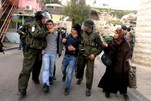
The Israeli occupation forces (IOF) killed last December six Palestinians and kidnapped hundreds in the West Bank and the Gaza Strip, according to a report released by the Hamas Movement on Wednesday.
According to its report, the IOF shot dead one Palestinian last month in Gaza while another one died of wounds he had sustained during the last war.
Four other Palestinians were killed by IOF gunfire in the West Bank.
The IOF also detained 327 Palestinians, including 58 children and four women, mostly from the West Bank.
During the reporting month, the IOF demolished 40 Palestinian homes, 10 commercial stores, 31 structures as well as one restaurant and one forge, and issued demolition orders against other homes.
The Israeli occupation authority, in turn, approved last month plans for the construction of 316 housing units in Jerusalem and annexed 321 dunums of Palestinian land.
The report also touched on some of the violations committed by the Palestinian Authority's security forces during the month, stating that they detained 235 cadres and supporters of the Palestinian resistance, mostly from Hamas, summoned 151 others for interrogation, and extended the detention of 32 others.
According to its report, the IOF shot dead one Palestinian last month in Gaza while another one died of wounds he had sustained during the last war.
Four other Palestinians were killed by IOF gunfire in the West Bank.
The IOF also detained 327 Palestinians, including 58 children and four women, mostly from the West Bank.
During the reporting month, the IOF demolished 40 Palestinian homes, 10 commercial stores, 31 structures as well as one restaurant and one forge, and issued demolition orders against other homes.
The Israeli occupation authority, in turn, approved last month plans for the construction of 316 housing units in Jerusalem and annexed 321 dunums of Palestinian land.
The report also touched on some of the violations committed by the Palestinian Authority's security forces during the month, stating that they detained 235 cadres and supporters of the Palestinian resistance, mostly from Hamas, summoned 151 others for interrogation, and extended the detention of 32 others.
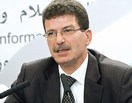
Head of the Palestinian prisoner society Qaddura Fares condemned Israel's acquittal of its soldier who had killed Palestinian minister Ziyad Abu Ein as "insolence and persistence in committing crimes."
Fares stated on Wednesday that Israel's attempt to clear its soldiers of committing crimes would not prevent the Palestinians from prosecuting them after they had killed Abu Ein in full view of the whole world.
He added that the killing of Abu Ein had been documented and videotaped and such Israeli fake probes would not be able to hide the truth.
"The Israeli government hastens after committing any crime to picture itself as a victim and open investigation so as to show the world that it a state of law, while it is in fact a gang of criminals," he said.
An investigation, conducted by head of the Israeli central command Nitzan Alon, absolved the soldier of wrongdoing against the late minister, saying the soldier acted properly and as required.
Fares stated on Wednesday that Israel's attempt to clear its soldiers of committing crimes would not prevent the Palestinians from prosecuting them after they had killed Abu Ein in full view of the whole world.
He added that the killing of Abu Ein had been documented and videotaped and such Israeli fake probes would not be able to hide the truth.
"The Israeli government hastens after committing any crime to picture itself as a victim and open investigation so as to show the world that it a state of law, while it is in fact a gang of criminals," he said.
An investigation, conducted by head of the Israeli central command Nitzan Alon, absolved the soldier of wrongdoing against the late minister, saying the soldier acted properly and as required.
7 jan 2015

An Israeli army probe launched into the murder of the Palestinian minister Ziad Abu Ein said the army was not found guilty of any criminal offense, Channel 10 reported Tuesday afternoon.
Preliminary findings of an investigation conducted by the Central Command, cleared the occupation army of any responsibility for the murder of the Palestinian minister Ziad Abu Ein, saying the soldiers acted as required of them.
Though the soldier was filmed pushing Abu Ein as he took part in an olive-planting campaign, the investigation claimed that no accusations of beating and gas firing were proved.
An autopsy conducted in the wake of the murder of the Palestinian minister, and attended by Palestinian, Jordanian and Israeli medical officials, showed Abu Ein died because of beating by the Israeli occupation soldiers and inhaling large amounts of tear gas in addition to the delay in his transfer to the hospital by the Israeli forces during a West Bank protest.
The Israeli forensic expert, who was present at the postmortem, reportedly agreed to the findings of the autopsy which he dubbed “professional” but later refused to sign the report.
Preliminary findings of an investigation conducted by the Central Command, cleared the occupation army of any responsibility for the murder of the Palestinian minister Ziad Abu Ein, saying the soldiers acted as required of them.
Though the soldier was filmed pushing Abu Ein as he took part in an olive-planting campaign, the investigation claimed that no accusations of beating and gas firing were proved.
An autopsy conducted in the wake of the murder of the Palestinian minister, and attended by Palestinian, Jordanian and Israeli medical officials, showed Abu Ein died because of beating by the Israeli occupation soldiers and inhaling large amounts of tear gas in addition to the delay in his transfer to the hospital by the Israeli forces during a West Bank protest.
The Israeli forensic expert, who was present at the postmortem, reportedly agreed to the findings of the autopsy which he dubbed “professional” but later refused to sign the report.
5 jan 2015

Burned clothes, remains of a wardrobe, walls covered with smoke, this is how the room of the two children Khalid and Amr in the Shati refugee camp west of Gaza looks like. They both were burned by the fire of candles they lit to lighten their dark house that was left along with thousands others without power due to the continued siege on Gaza for eight uninterrupted years.
In that room, where the kids were seeking safety and warmth in the severe cold winter, Amr thought that hiding in the wardrobe would protect him from the flames that burned his brother, but he was mistaken, few seconds later, they both were lying dead and their little sister Sarah was rescued.
Frequent power outages
Khalid and Amr al-Habil are not the only Gazans burned by the “blockade candles”, at the beginning of winter each year many Gazans die in the same way, as a result of the frequent power outages prompting the residents to use candles to provide their children with a glimmer of light.
The Gaza Strip has been suffering from the "6 hours on, 12 hours off" power schedule; causing loads on the power networks, breakdowns and electric shocks.
With pain and grief, the grandfather of the two children told the PIC: "the fire broke out at 7 pm last night”, adding that his son (the children's father) tried to rescue them but he fainted. He said: "when we saw the smoke rising we rushed to the apartment which is on the third floor, but it was too late, Khalid was lying on the ground and Amr was inside his wardrobe which he thought would protect him."
The children's mother who could barely talk told our correspondent: "the electricity was off in the area, and we were lighting up the room using a candle, the children were in their bedroom and suddenly a fire broke out inside the room." The bereaved mother added: "my husband tried to rescue the children and opened the closed room door, but he couldn't bare the rising smoke and fainted, then the neighbors came in and took us outside, and we knew that Khalid and Amr have died."
With a heart wrenching in pain, the devastated mother wondered: "why do we have to pay the price? Why can't we live like other people?"
Rescue attempts
Abd Haneyya, a neighbor of the affected family, was one of the first young men who tried to rescue the family. He said that when he learned about the fire he rushed to the house of al-Habil family carrying a blanket. "The smoke was thick and there was no fire in the entrance of the apartment, and when I entered I bumped into the little girl Sarah while the fire was approaching her, I couldn't bare the smoke so I threw the blanket beside her and went out and fainted for seconds then I woke up and went into the apartment again and rescued the little girl," Haneyya said.
Khalid and Amr are two new victims in a list of 20 others who passed away throughout the blockade years because of similar fires that were caused by electricity and fuel crises.
In that room, where the kids were seeking safety and warmth in the severe cold winter, Amr thought that hiding in the wardrobe would protect him from the flames that burned his brother, but he was mistaken, few seconds later, they both were lying dead and their little sister Sarah was rescued.
Frequent power outages
Khalid and Amr al-Habil are not the only Gazans burned by the “blockade candles”, at the beginning of winter each year many Gazans die in the same way, as a result of the frequent power outages prompting the residents to use candles to provide their children with a glimmer of light.
The Gaza Strip has been suffering from the "6 hours on, 12 hours off" power schedule; causing loads on the power networks, breakdowns and electric shocks.
With pain and grief, the grandfather of the two children told the PIC: "the fire broke out at 7 pm last night”, adding that his son (the children's father) tried to rescue them but he fainted. He said: "when we saw the smoke rising we rushed to the apartment which is on the third floor, but it was too late, Khalid was lying on the ground and Amr was inside his wardrobe which he thought would protect him."
The children's mother who could barely talk told our correspondent: "the electricity was off in the area, and we were lighting up the room using a candle, the children were in their bedroom and suddenly a fire broke out inside the room." The bereaved mother added: "my husband tried to rescue the children and opened the closed room door, but he couldn't bare the rising smoke and fainted, then the neighbors came in and took us outside, and we knew that Khalid and Amr have died."
With a heart wrenching in pain, the devastated mother wondered: "why do we have to pay the price? Why can't we live like other people?"
Rescue attempts
Abd Haneyya, a neighbor of the affected family, was one of the first young men who tried to rescue the family. He said that when he learned about the fire he rushed to the house of al-Habil family carrying a blanket. "The smoke was thick and there was no fire in the entrance of the apartment, and when I entered I bumped into the little girl Sarah while the fire was approaching her, I couldn't bare the smoke so I threw the blanket beside her and went out and fainted for seconds then I woke up and went into the apartment again and rescued the little girl," Haneyya said.
Khalid and Amr are two new victims in a list of 20 others who passed away throughout the blockade years because of similar fires that were caused by electricity and fuel crises.
4 jan 2015
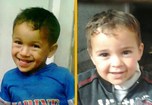
Khaled al-Habil 4
Amr Mohamed al-Habil 5
Two Palestinian children died on Saturday evening after a fire engulfed their family home in the blockaded Gaza Strip.
Spokesman for the Health Ministry Ashraf al-Qudra said the five-year-old child Amr Mohamed al-Habil and his cousin Khaled, 4, succumbed to the devastating fire that suddenly broke out at al-Habil’s family home at the Shati refugee camp.
22-year-old Mohamed Khaled al-Habil was seriously injured in the same incident.
Spokesman for the Civil Defense Mohamed al-Maydana said the fire was caused by a lit candle at the casualties’ family home.
A power crisis rocking the war-battered Gaza Strip with the advent of a freezing winter has made life unbearable for Gazans. Due to the blockade and scarce fuel supplies to the sole power generation station in the Strip, houses are supplied with power for only 4 hours a day.
Amr Mohamed al-Habil 5
Two Palestinian children died on Saturday evening after a fire engulfed their family home in the blockaded Gaza Strip.
Spokesman for the Health Ministry Ashraf al-Qudra said the five-year-old child Amr Mohamed al-Habil and his cousin Khaled, 4, succumbed to the devastating fire that suddenly broke out at al-Habil’s family home at the Shati refugee camp.
22-year-old Mohamed Khaled al-Habil was seriously injured in the same incident.
Spokesman for the Civil Defense Mohamed al-Maydana said the fire was caused by a lit candle at the casualties’ family home.
A power crisis rocking the war-battered Gaza Strip with the advent of a freezing winter has made life unbearable for Gazans. Due to the blockade and scarce fuel supplies to the sole power generation station in the Strip, houses are supplied with power for only 4 hours a day.
1 jan 2015
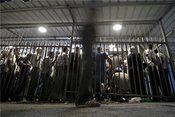
Ahmad Samih Bdeir 39
Palestinian workers wait at a checkpoint in Bethlehem to enter Israel.
A Palestinian man from the occupied West Bank village of Farun died Wednesday morning, after being crushed to death inside an Israeli checkpoint near Tulkarem, while trying to get to work.
Witnesses said, according to Ma'an News Agency, that 39-year-old Ahmad Samih Bdeir, who was on his way to a construction job inside Israel, choked to death in extreme overcrowding amid large numbers of people trying to cross the al-Tayba checkpoint, also called "Shaar Efrayim".
The death is the second at al-Tayba this year, now, after 59-year-old Adel Muhammad Yakoub also died as a result of extreme overcrowding at the checkpoint, in early January.
Inspection procedures at the checkpoint typically take hours, Ma'an reports, as every person must pass through metal turnstiles one-at-a-time.
The turnstiles are controlled by Israeli soldiers from hidden posts, and workers frequently complain about unnecessary delays caused by checkpoint staff (typically teen-aged conscripts finishing out their compulsory military service).
Furthermore, following the revolving gates are metal detectors and inspection stations. Palestinians are often herded into metal pens inside these checkpoints, are unable to leave or enter, while Israeli soldiers rarely respond to requests for movement from those crammed inside.
Sources within the Palestinian Federation of Trade Unions said that more than 15,000 Palestinian workers pass through al-Tayba checkpoint every day, and that the checkpoint is operated by the Israeli military as well as by private Israeli security companies.
Around 30,000 Palestinians have reportedly received permits to work in Israel and are, thus, forced to cross the checkpoints on a daily basis, while Israel continues to deny permits to tens of thousands of other applicants, with up to 30,000 Palestinians working in Israel without permits.
Ma'an further reports that, little more than a week ago, more than 5,000 Palestinian workers refused to cross the checkpoint in the morning, in protest of the humiliating inspection procedures.
Palestinian workers wait at a checkpoint in Bethlehem to enter Israel.
A Palestinian man from the occupied West Bank village of Farun died Wednesday morning, after being crushed to death inside an Israeli checkpoint near Tulkarem, while trying to get to work.
Witnesses said, according to Ma'an News Agency, that 39-year-old Ahmad Samih Bdeir, who was on his way to a construction job inside Israel, choked to death in extreme overcrowding amid large numbers of people trying to cross the al-Tayba checkpoint, also called "Shaar Efrayim".
The death is the second at al-Tayba this year, now, after 59-year-old Adel Muhammad Yakoub also died as a result of extreme overcrowding at the checkpoint, in early January.
Inspection procedures at the checkpoint typically take hours, Ma'an reports, as every person must pass through metal turnstiles one-at-a-time.
The turnstiles are controlled by Israeli soldiers from hidden posts, and workers frequently complain about unnecessary delays caused by checkpoint staff (typically teen-aged conscripts finishing out their compulsory military service).
Furthermore, following the revolving gates are metal detectors and inspection stations. Palestinians are often herded into metal pens inside these checkpoints, are unable to leave or enter, while Israeli soldiers rarely respond to requests for movement from those crammed inside.
Sources within the Palestinian Federation of Trade Unions said that more than 15,000 Palestinian workers pass through al-Tayba checkpoint every day, and that the checkpoint is operated by the Israeli military as well as by private Israeli security companies.
Around 30,000 Palestinians have reportedly received permits to work in Israel and are, thus, forced to cross the checkpoints on a daily basis, while Israel continues to deny permits to tens of thousands of other applicants, with up to 30,000 Palestinians working in Israel without permits.
Ma'an further reports that, little more than a week ago, more than 5,000 Palestinian workers refused to cross the checkpoint in the morning, in protest of the humiliating inspection procedures.
Page: 2 - 1
